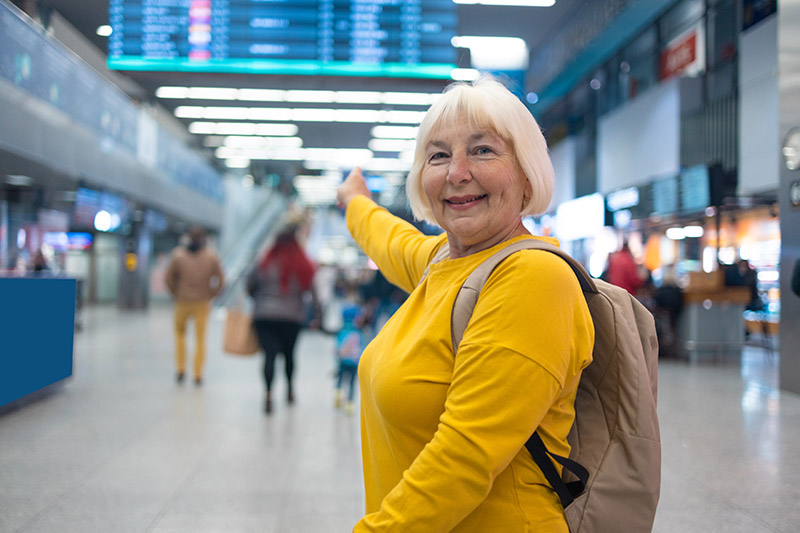12 Tips for Safe Family Travel with Seniors
It’s the peak time of year for family vacations—a great time to make lifelong memories with your senior loved ones. While they may not be up for a trip to Disneyland, there are plenty of lower-intensity destinations that the whole family can enjoy together.
While traveling with elderly family members can be a rewarding experience, offering precious memories and quality time together, you’ll need to do some careful planning and take precautions to protect the health and safety of senior travelers.
Here’s how families can prepare for a trip that includes their senior loved ones and ensure everyone enjoys a safe and comfortable journey.
Planning ahead for a smooth experience
Before you buy those plane tickets and book accommodations, check these tasks off your list.
1. Consult with your loved one’s doctors
Before making any definitive plans, discuss your loved one’s capabilities with their healthcare providers. A general check-up can assess their fitness for travel and address potential needs, such as vaccinations, medications, or special precautions based on their health status.
If your loved one’s doctor suggests limiting air travel or time spent in a car, you’ll need to plan accordingly. In addition, if you’re traveling abroad, you may need to look into legal concerns like power of attorney.
2. Choose the right destination
Opt for a destination that’s senior-friendly, with easy access to medical facilities, comfortable accommodations, and a wide range of non-strenuous activities. Dig into the details, such as the climate and the physical layout of the destination—places with extreme weather conditions or lots of stairs may not be ideal for seniors with mobility or health issues.
3. Plan for accessibility
Ensure that all parts of the trip are accessible and as comfortable as possible. For example, you may want to book non-stop flights to limit rushes through the airport to catch a connection or upgrade your seats for more comfort.
If needed, you can also arrange ahead of time for wheelchair access at airports and hotels and secure accessible transportation for sightseeing. Check if attractions are senior-friendly and see what accommodations they offer for those with limited mobility.
Making travel comfortable and safe
Once you have your trip planned out, it’s time to address the fine details to ensure comfort and safety during travel.
4. Make sure you have the essentials
Pack a carry-on travel bag—not a checked bag—with all essentials, including prescription and over-the-counter medications (enough for the entire trip, plus extra), copies of prescriptions or a letter from your loved one’s doctor, and a list of emergency contacts.
Depending on your destination, there may be regulations regarding prescription medications, so check for any applicable rules beforehand. You may also want to include snacks, water, and any items that can help make the journey more comfortable, such as pillows, earplugs, and blankets.
5. Purchase adequate insurance coverage
There are a couple of different types of travel insurance: medical and comprehensive. The former covers any medical emergencies that happen while traveling in an area where your primary insurance doesn’t apply, while the latter covers medical expenses plus inconveniences like delays and lost luggage.
Most people think that medical travel insurance is only necessary if you’re traveling abroad, but it can also help protect you from high out-of-network fees domestically. Make sure the travel insurance you choose covers pre-existing conditions and includes provisions for medical evacuation if needed. The added peace of mind will be well worth the minor cost.
6. Prep for a smooth journey
If you’re traveling by air, request wheelchair services at the airport and priority boarding to make things as easy as possible. If your senior loved one hasn’t flown in some time, you may need to help them with packing to ensure they meet all the TSA requirements.
For road trips, plan for frequent stops to stretch, use the restroom, and eat and hydrate. Keep important documents and medications easily accessible throughout the journey, and plan for a more leisurely trip than you might be used to. While you may be okay with driving eight hours straight through to your destination, your senior loved one may not be physically capable of sitting in a car for that long.
Enjoying a fun but safe trip
Once you arrive at your destination, keep these tips in mind to ensure everyone stays safe and has a great time.
7. Balance accessible activities with rest
You might be tempted to pack your itinerary with activities to maximize your time, but balance is key. Include plenty of rest periods and low-intensity activities to prevent exhaustion, dehydration, and other health concerns, especially in extremely hot or cold climates.
Keep the activities inclusive as well. Think museum tours with guided audio for seniors who have trouble hearing, venues with wheelchair accessibility for those with mobility issues, and places with plenty of seating for breaks.
8. Stay hydrated and nourished
Always carry water and encourage your senior loved one to stay hydrated. Keep meals in line with their regular diet and schedule, and avoid heavy or spicy foods that might upset their stomach during travel. If it’s hot out, plan any outdoor activities in the morning or evening, and stay indoors during the hottest part of the day.
9. Monitor health throughout the trip
Keep an eye on how your senior loved one is feeling throughout the trip. They may be hesitant to say anything, not wanting to inconvenience or disappoint anyone, so look for signs of fatigue, discomfort, or health issues and be ready to adjust your plans accordingly. Sometimes, a simple day of rest at the hotel can be beneficial.
Creating lasting memories
Finally, don’t forget the whole purpose of the trip—creating memories that will last a lifetime.
10. Keep the mood positive
Make sure you respect your loved one’s autonomy, capabilities, and needs without infantilizing them or making them feel like an inconvenience. If you have kids who will be coming on the trip, talk to them beforehand about their senior relative’s ability levels and explain that the vacation is about ensuring everyone has a good time. This can help ward off any complaints about missing non-accessible activities and subsequent hurt feelings.
11. Include everyone in planning
Involve your senior loved ones in the planning process, and let them help choose activities and destinations that interest them. This inclusion will make the trip more enjoyable for them and give them something to look forward to. They may also have insights into their capability levels that you might have overlooked.
12. Capture the moments
Take plenty of photos and videos to capture this special time together. Once you’re back home, create a scrapbook, photo book, or digital photo album to reminisce about the experience, or host a viewing party where everyone gets together to check out the photos and videos from the trip.
Keep your senior loved ones safe at home and on the road
Traveling safely with seniors takes some additional planning and precautions, but with the right preparations, it can be a rewarding and memorable experience for the entire family. By focusing on health, safety, and comfort, you can ensure that your elderly loved ones enjoy the journey just as much as the destination.
At Right Hand Senior Care, we want all of our clients to live life to the fullest, and while we may not be able to accompany you on vacation, we can ensure your loved one’s health and safety at home. Our dedicated, compassionate in-home caregivers are ready to deliver the care your loved one needs and make things a little easier for you, your senior loved ones, and your family.
For more information on our in-home care services or to set up a custom care plan, contact us today.

We are Superheroes in Comfortable Clothes™
We take care of our clients, their families, our staff, and our league of franchise owners.

